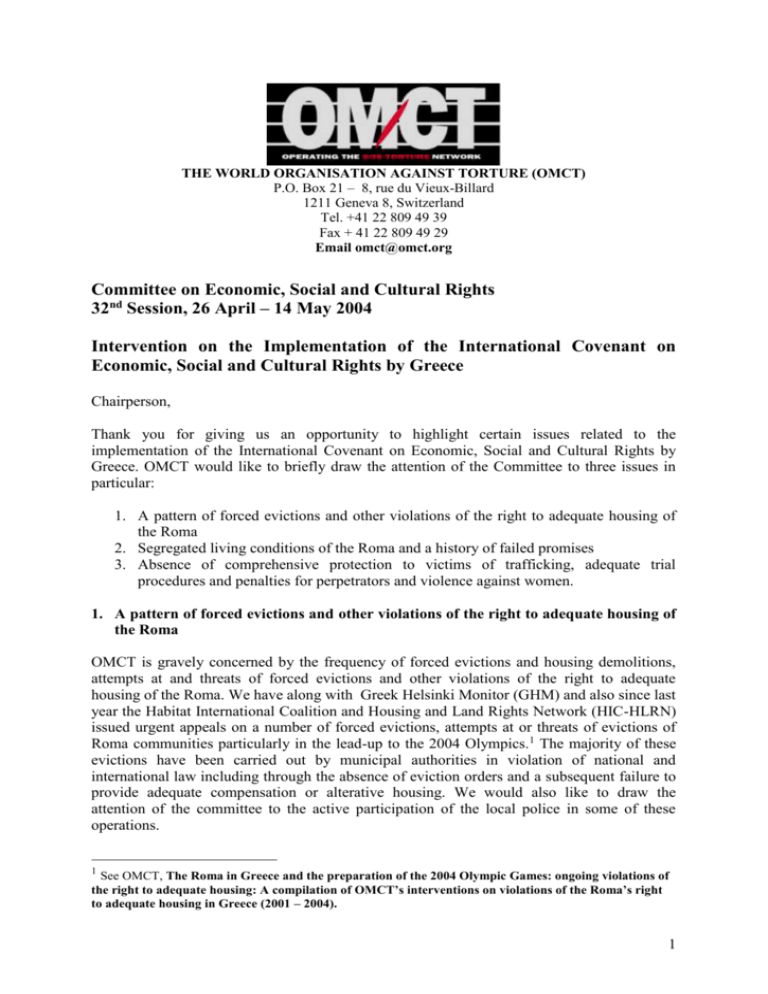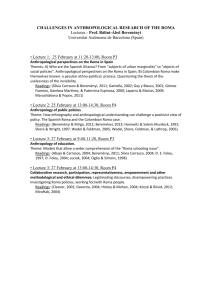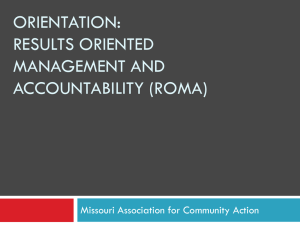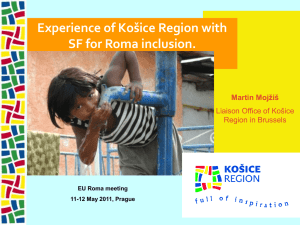OMCT`s interventions
advertisement

THE WORLD ORGANISATION AGAINST TORTURE (OMCT) P.O. Box 21 – 8, rue du Vieux-Billard 1211 Geneva 8, Switzerland Tel. +41 22 809 49 39 Fax + 41 22 809 49 29 Email omct@omct.org Committee on Economic, Social and Cultural Rights 32nd Session, 26 April – 14 May 2004 Intervention on the Implementation of the International Covenant on Economic, Social and Cultural Rights by Greece Chairperson, Thank you for giving us an opportunity to highlight certain issues related to the implementation of the International Covenant on Economic, Social and Cultural Rights by Greece. OMCT would like to briefly draw the attention of the Committee to three issues in particular: 1. A pattern of forced evictions and other violations of the right to adequate housing of the Roma 2. Segregated living conditions of the Roma and a history of failed promises 3. Absence of comprehensive protection to victims of trafficking, adequate trial procedures and penalties for perpetrators and violence against women. 1. A pattern of forced evictions and other violations of the right to adequate housing of the Roma OMCT is gravely concerned by the frequency of forced evictions and housing demolitions, attempts at and threats of forced evictions and other violations of the right to adequate housing of the Roma. We have along with Greek Helsinki Monitor (GHM) and also since last year the Habitat International Coalition and Housing and Land Rights Network (HIC-HLRN) issued urgent appeals on a number of forced evictions, attempts at or threats of evictions of Roma communities particularly in the lead-up to the 2004 Olympics.1 The majority of these evictions have been carried out by municipal authorities in violation of national and international law including through the absence of eviction orders and a subsequent failure to provide adequate compensation or alterative housing. We would also like to draw the attention of the committee to the active participation of the local police in some of these operations. 1 See OMCT, The Roma in Greece and the preparation of the 2004 Olympic Games: ongoing violations of the right to adequate housing: A compilation of OMCT’s interventions on violations of the Roma’s right to adequate housing in Greece (2001 – 2004). 1 An example of this is the Roma settlement of Aspropyrgos, situated near Athens, has been one settlement where municipal authorities have been using the preparation of the Olympic Games as a pretext to carry out forced evictions. Overall, from 2000 on, Roma communities of Aspropyrgos have been threatened with eviction. On 14th July 2000, a Romani settlement was destroyed with a bulldozer in the presence of the Mayor and the police. All families in the settlement situated on the garbage dump were ordered to leave within three days. According to eye-witnesses, no eviction warrants or orders were presented to the Roma families, nor was the operation carried out with the authorisation or presence of a public prosecutor, as is required under Greek Law. The action taken by the municipality was found to be illegal by the Greek Ombudsman who also recommended an administrative sanction by the authorities of the Mayor, George Liakos. To date, George Liakos continues to function as the Aspropyrgos Mayor. He has however been indicted for breach of duty and will stand trial before the Three Members Misdemeanours Court on May 21, 2004. Eight months after the Ombudsman’s report was released, the same municipal authorities proceeded to demolish 6 more homes, together with all their contents and damage another in a Roma settlement. These are just two out of seven documented incidents of demolitions, threats and other attempts to drive away Roma from settlements in Aspropyrgos alone from 1999 to mid 2003. It is also noteworthy that though the Olympic games were cited as an excuse for the evictions or to refuse the relocation of the Roma to certain cites, no Olympic facilities have ultimately been constructed in this area. Local authorities in Aghia Paraskevi, Ano Liosia, Halandri and Marousi have openly claimed that they want the land on which the Roma are settled or meant to be settled, to build sports facilities for the 2004 Olympic Games in Athens. The National Human Rights Commission recognised that evictions from many sites ahead of the Olympic Games were taking place with the, sometimes false, pretext of constructing sports facilities. The Commission particularly highlighted the fact that the Municipality of Aspropyrgos did not even bother to follow the existing legal procedures of eviction, using instead the offending argument of “cleaning the area from garbage”. 2. Segregated living conditions of the Roma and a history of failed promises Roma communities often live in settlements which are segregated from other communities and in stark contrast to housing conditions generally found in Greece, in extremely poor conditions where they lack access to electricity, water, education or other basic services. Art. 3.1 of a 1983 Ministerial decision, that has now been amended, stated that “lands for the organised encampments of wandering nomads (Gypsies etc.) which are going to be designated must be outside the inhabited areas and in good distance from approved urban plan or the last consecutive houses”. It appears that in response to this decision many of the settlements are located in segregated areas far away from the rest of society and the frequent absence of public transport to these areas makes it extremely difficult for Roma children to attend school or for the community to access public facilities and services. In some instances, this failure appears to be utilised by the Municipal authorities as a tactic to drive the Roma away and in combination with a failure to register Roma as local residents in municipal roles ensures the Roma are both discriminated against and excluded from provision of essential services such as water, education and health. For instance, in the municipality of Nea Alikarnassos, the authorities refused to have the Roma children registered in the municipal list though they were born there and to allow them to attend local schools because the camp was not within the enrolment boundaries of any school. Though the Ministerial decision has now been amended, 2 it still raises some areas of concern and the effect of this decision on communities and on administrative practices will need to be countered through concerted and sustained action. OMCT welcomes the information submitted by the government of Greece on the Integrated Action Plan for the Social Integration of Greek Gypsies and hope that more information on implementation till date will be made available to the Committee. OMCT is specially concerned that though Roma communities are meant to be relocated to newer better equipped settlements, in reality they are often removed to distant and segregated areas. In this process they lose whatever access to infrastructure they previously enjoyed and become dependent on municipalities for provision of services, which despite numerous promises, often fails to materialise. 22 Roma families who were relocated to what was described as a ‘model settlement; in Spata in October 2000 have still not been given no electricity or running water facilities and children from the community lost 3 years of schooling because of lack of promised public transport. Another egregious example of this is prosecution of 27 Roma in Glykeia for violating national sanitary provisions regulating living conditions in temporary settlements, despite the fact they had been placed in this dilapidated settlement by the Prefecture of Argolida, who had then failed to provide them with basic facilities or services. In this regard we are also disturbed by the number of extremely racist and offensive remarks about the Roma that by local municipal officials and Mayors, documented by the Greek Helsinki Monitor. OMCT believes that the systematic discrimination against the Roma demonstrated through institutional practices, discriminatory legislation and regulations and official attitudes severely limits the realisation of the economic, social and cultural rights of the Roma in Greece. 3. Absence of comprehensive protection to victims of trafficking, adequate trial procedures and penalties for perpetrators and violence against women.2 Greece is a destination and transit country for women and children trafficked for the purpose of sexual exploitation. According to a government source, as many as 18,000 people were trafficked to Greece in 2002. Children from the Greek Roma community are also trafficked for labour. In October 2002, the government passed a new anti-trafficking legislation to criminalize and punish traffickers, as well as to develop victim support, but there is no provision for labour trafficking. The provisions of the new anti-trafficking law outlining victim protection and assistance are also regulated in a decree published in August 2003 but are yet to be effectively implemented. Victim assistance mechanisms have therefore not yet been implemented and NGO cooperation remains weak, while Greek courts do not appear eager to defend victims’ rights. As an illustration of this situation is the case of Olga B., a trafficking victim who was raped by a policeman in 1998. The policeman was acquitted for the rape by a court in Patras in May 2003. At the trial, the police officer was given a 2 year suspended sentence for breach of duty as a police officer since he knew that trafficking victims were being held in a bar, did not report the crime, and engaged in intercourse with one of the victims. The bar owner was sentenced to 3 years in prison for trafficking and three other defendants were also sentenced to two years in prison each for procuring women or assisting in the trafficking of women. However, the sentences of these 4 co-defendants were converted into fines (1600 Euros per year) as the court concluded that "a pecuniary fine is sufficient to deter them all from 2 OMCT and GHM, Torture and other Forms of Ill-Treatment in Greece: The Situation of Women, Roma and Aliens, Report submitted to the EU Network of Independent Experts in Fundamental Rights at its Hearing of 16 October 2003 3 repeating the crime, after evaluating their characters and surrounding circumstances." In March 2004, there was a re-trial on the rape charges and the verdict of the jury was split, resulting in another acquittal for the policeman. On April 5, OMCT received the information that the prosecutor had decided to appeal the second acquittal. According to the victim, she was never summoned to testify or to be present at the proceedings. In the absence of the victim at the trial, the court concluded that she had consented to sexual intercourse with the police officer. The other witnesses who had testified on behalf of the victim at the preliminary hearings also were not summoned and were not present at the trial. Additionally, there was a lack of due diligence in investigating the victim’s claim of rape, and the case came to trial five years after the initial claim was made. Olga B. has not received any form of effective protection during these proceedings despite the risks she faces and the threats she has received. Irina, a key witness in Olga's case also has received no form of witness protection. Despite a successful request for a special residency permit, Olga B. has still not received her permit and continues to live illegally in Greece. In addition, the State has provided no legal aid to Olga or the NGOs assisting her in her litigation. As Olga cannot legally work, with no residency permit, she is forced to depend on the charity of friends to help her afford the litigation. The information received indicates that all other trafficking victims who are attempting to press charges against traffickers are in the same position as Olga, with no residency permit and no legal aid from the State. In terms of relation to domestic violence, most Greek women suffering from abuse do not press charges against their abusive partners for the following various reasons. Apart from the heaviness of the judicial system regarding family violence (on average, a criminal case takes 3-5 years for complete adjudication), there is an extremely limited infrastructure for the empowerment and support of victims of family violence. Subsequently, even if a woman chooses to take legal action against her violent spouse and press criminal charges, there is no welfare solution or alternative provided for her by the State, as in adequate support facilities that may provide help and protection to her and her children for the years she will be involved in judicial adventures. OMCT is also concerned that the marital rape is not a crime under the Greek Penal Code and that the marital relationship figures as a cover for violence in the home. In addition to these issues, OMCT would like to draw the attention of the Committee to the complaint3 against Greece that it lodged on 28 July 2003, relating to Article 17 (the right of mothers and children to social and economic protection) of the European Social Charter. It is alleged that Greek law has not effectively prohibited corporal punishment of children, nor has it prohibited other forms of degrading punishment or treatment of children and provided adequate sanctions in penal or civil law. We have submitted copies of documents compiling our interventions and reports on these issues for distribution to members of the Committee. We are of course available at any time for any questions or clarifications or to provide any additional information that may be required. Thank You. For further information, please contact Meghna Abraham at mab@omct.org or on 022 8094939 3 No. 17/2003 World Organisation Against Torture (OMCT) v. Greece, declared admissible on 9 December 2003. 4









